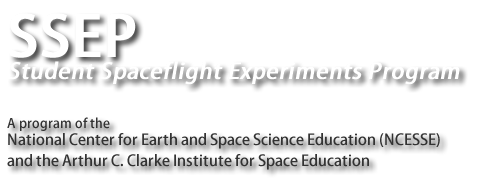We have set up two separate types of FAQs (Frequently Asked Questions) for SSEP which are updated as questions are received by the SSEP Team—
1. SSEP Program FAQ
This FAQ relates to the overall Student Spaceflight Experiments Program, e.g., questions on program pedagogy, the Flight Experiment Design Competition, the Community Program, program customization to community need, program implementation, program cost, and how to participate. These are topics that are addressed in general terms on the More on SSEP page.
Jump to:
SSEP Program FAQ
2. SSEP Experiment Design FAQs
The Experiment Design FAQ relates to all aspects of flight experiment design, e.g., questions on how to think about the experiment opportunity, the science that can be done in microgravity, the operation of the mini-laboratory to be used, constraints on experiment design such as the allowed fluids and solids that can be used in an experiment, and the milestones and due dates associated with the flight experiments. These topics are generally addressed on the Designing the Flight Experiment page, and the Mini-Laboratory Operation and Critical Timeline pages for your flight opportunity.
Jump to:
SSEP Mission 18 to ISS: Experiment Design FAQ
SSEP Mission 17 to ISS: Experiment Design FAQ
SSEP Mission 16 to ISS: Experiment Design FAQ
Experiment Design FAQ Archive for Completed Missions
To submit a question to the SSEP Team, use the Contact Us page, or send an email
to ssep@ncesse.org
